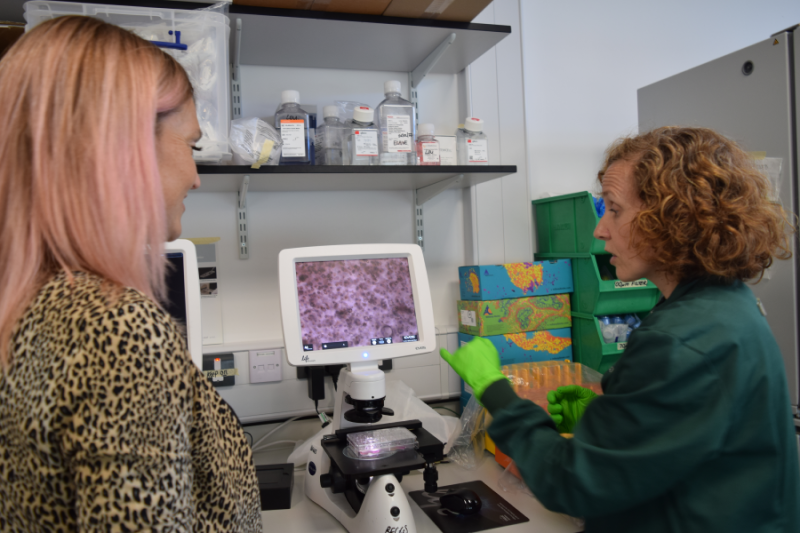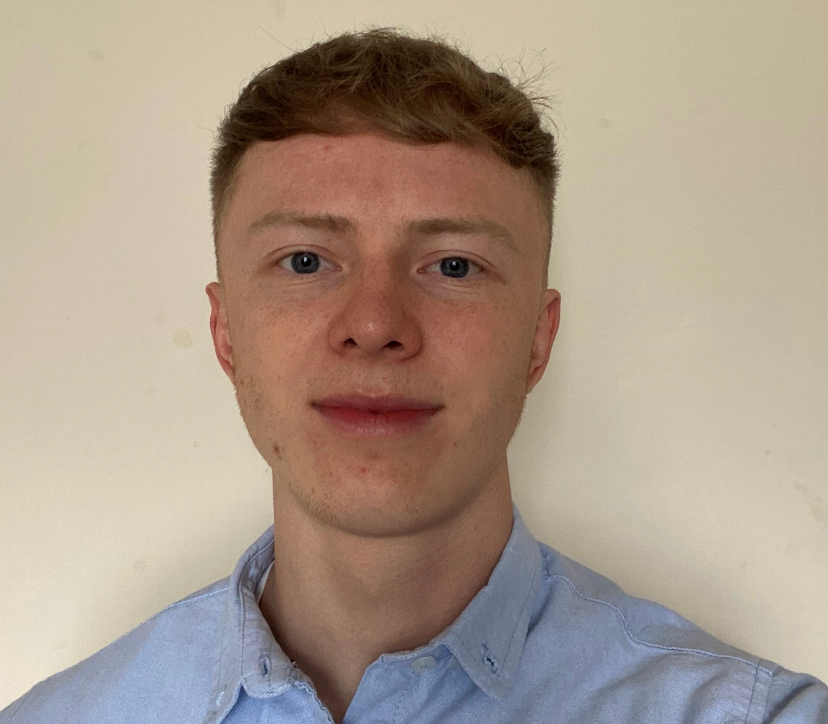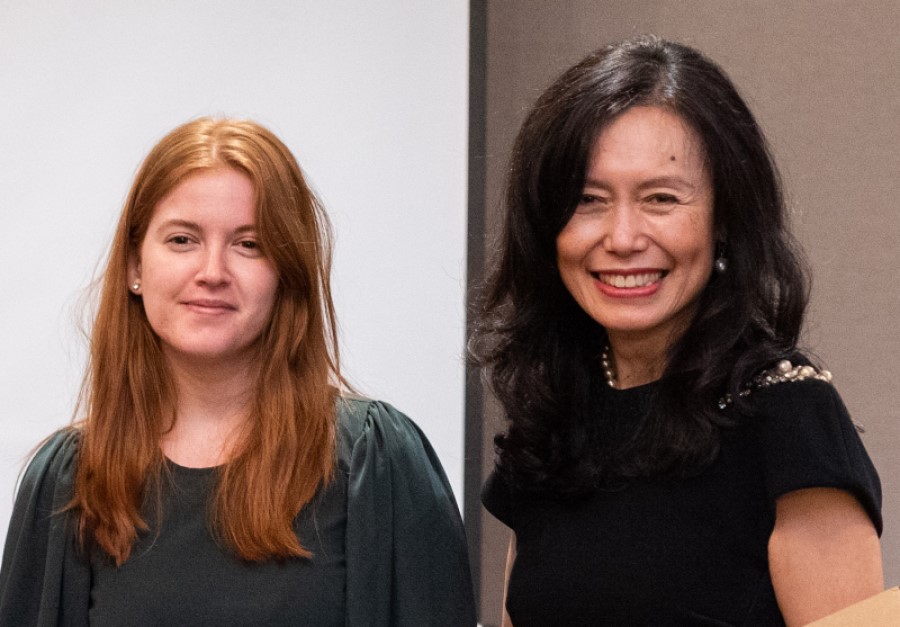From cancer survival to fighting infections, the research stars of the future are contributing to new discoveries and making breakthroughs of their own. Meet the PhD students who could change the world. PhDs and Masters degrees nurture talented young academics, enabling them to make a significant contribution to their subject. These talented students speed up vital research, and have the potential to make major breakthroughs; such as reinventing the way we treat COVID-19 for at-risk groups and tackling huge challenges such as drug resistant cancer.
Cara is helping Lou find new ways to treat drug-resistant cancers
 There was little or no research about the type of bowel cancer Lee Hancock was diagnosed with (known as BRAF V600E) so, along with his wife Cara de Faye, they set about fundraising for a research project to find out more. The PhD student they supported, Louise Tee (first year, PhD), explains: 'It is remarkable to work on a project with donors who have such vision and drive. Lee's type of drug resistant cancer was rare, but we hope that the insights we gain during this project will help inform the treatment for other hard to treat cancers too.' Lee sadly passed away earlier this year, but Cara continues to fundraise in his memory: 'I was struck by the compassion and understanding of the research team, and their drive to help find a solution for us. Although we can't now help Lee, drug resistant cancer is becoming more prevalent so thousands of people like him could benefit from this research in the future.'
There was little or no research about the type of bowel cancer Lee Hancock was diagnosed with (known as BRAF V600E) so, along with his wife Cara de Faye, they set about fundraising for a research project to find out more. The PhD student they supported, Louise Tee (first year, PhD), explains: 'It is remarkable to work on a project with donors who have such vision and drive. Lee's type of drug resistant cancer was rare, but we hope that the insights we gain during this project will help inform the treatment for other hard to treat cancers too.' Lee sadly passed away earlier this year, but Cara continues to fundraise in his memory: 'I was struck by the compassion and understanding of the research team, and their drive to help find a solution for us. Although we can't now help Lee, drug resistant cancer is becoming more prevalent so thousands of people like him could benefit from this research in the future.'
A donor is helping Peter to improve quality of life and survivability for patients with COVID-19
 The risk from COVID-19, and its impact on the healthcare system nationally and internationally remains a huge ongoing challenge. Peter Smith (first year, PhD) is working with patients to observe whether the immuno-suppressive effects of paracetamol affect both vaccinations and treatment for certain at-risk groups. He will also be looking at how well COVID-19 treatments work, and why certain individuals have the disease more seriously than others from the same age group and background. His PhD has been funded by a single donor with a passion for medical research and the project could have implications for healthcare worldwide. Peter is excited that his PhD could impact such a huge healthcare challenge: 'This is such an exciting opportunity for me to increase my skills and confidence, while helping to build a picture of who is most at risk from COVID-19 and what exactly is happening to the body during the course of the disease.'
The risk from COVID-19, and its impact on the healthcare system nationally and internationally remains a huge ongoing challenge. Peter Smith (first year, PhD) is working with patients to observe whether the immuno-suppressive effects of paracetamol affect both vaccinations and treatment for certain at-risk groups. He will also be looking at how well COVID-19 treatments work, and why certain individuals have the disease more seriously than others from the same age group and background. His PhD has been funded by a single donor with a passion for medical research and the project could have implications for healthcare worldwide. Peter is excited that his PhD could impact such a huge healthcare challenge: 'This is such an exciting opportunity for me to increase my skills and confidence, while helping to build a picture of who is most at risk from COVID-19 and what exactly is happening to the body during the course of the disease.'
Alumni are helping Matthew investigate bacterial infections and antimicrobial resistance
 Hundreds of donors contributed to Associate Professor Sophie Cox's research, designing systems to enable the use of antibiotic alternatives, including natural materials such as honey. Antimicrobial resistance remains a huge health and development threat, with the success of modern medicine dependent on our ability to treat infections. Student Matthew Lewis's MSc in Chemical Engineering is part-funded by alumni and friends to enable him to support Sophie's research, which addresses the risk that diseases are becoming resistant to our current medicines. He is using a bioreactor to grow bacteria (E. coli and S. aureus) to help define the optimal treatments to eliminate the bacteria, giving a better understanding of the effectiveness of antibiotics when given to a patient. 'The most interesting and exciting part of this project is being able to carry out novel, cutting-edge research that could potentially be used in the future to support dosing decisions in the clinic.'
Hundreds of donors contributed to Associate Professor Sophie Cox's research, designing systems to enable the use of antibiotic alternatives, including natural materials such as honey. Antimicrobial resistance remains a huge health and development threat, with the success of modern medicine dependent on our ability to treat infections. Student Matthew Lewis's MSc in Chemical Engineering is part-funded by alumni and friends to enable him to support Sophie's research, which addresses the risk that diseases are becoming resistant to our current medicines. He is using a bioreactor to grow bacteria (E. coli and S. aureus) to help define the optimal treatments to eliminate the bacteria, giving a better understanding of the effectiveness of antibiotics when given to a patient. 'The most interesting and exciting part of this project is being able to carry out novel, cutting-edge research that could potentially be used in the future to support dosing decisions in the clinic.'
Kathleen is helping Bethan identify how COVID-19 has changed education
 Bethan Morris-Tran (second year, PhD Education) was so grateful to meet the woman who is supporting her PhD during a recent research trip to Malaysia. Bethan is examining the disruption and changes to education through the pandemic, gathering information from various countries to explore how a better system can be built as a result. 'Having Kathleen as the sponsor of my PhD has opened doors for me, and enabled me to establish connections in the field,' she says. 'This has helped my research to be more informed and inclusive of many perspectives, and allowed me to do research that I am both passionate and excited about.' For Kathleen Chew (LLB Law, 1981), support for education is key: 'By supporting education in this way I can help develop the leaders of the future who can themselves inspire and support future generations.'
Bethan Morris-Tran (second year, PhD Education) was so grateful to meet the woman who is supporting her PhD during a recent research trip to Malaysia. Bethan is examining the disruption and changes to education through the pandemic, gathering information from various countries to explore how a better system can be built as a result. 'Having Kathleen as the sponsor of my PhD has opened doors for me, and enabled me to establish connections in the field,' she says. 'This has helped my research to be more informed and inclusive of many perspectives, and allowed me to do research that I am both passionate and excited about.' For Kathleen Chew (LLB Law, 1981), support for education is key: 'By supporting education in this way I can help develop the leaders of the future who can themselves inspire and support future generations.'